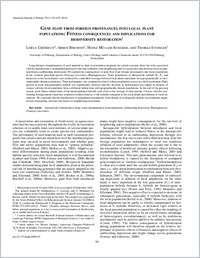Gene flow from foreign provenances into local plant populations: Fitness consequences and implications for biodiversity restoration
- Crémieux, Lisèle University of Fribourg, Departement of Biology, Unit of Ecology and Evolution, Switzerland
- Bischoff, Armin University of Fribourg, Departement of Biology, Unit of Ecology and Evolution, Switzerland - National Institute of Horticulture and Landscape Planning (INPH), Department of Biological Sciences, Angers, France
- Müller-Schärer, Heinz University of Fribourg, Departement of Biology, Unit of Ecology and Evolution, Switzerland
- Steinger, Thomas University of Fribourg, Departement of Biology, Unit of Ecology and Evolution, Switzerland - Agroscope Changins-Wädenswil ACW, Route de Duillier, Nyon 1, Switzerland
-
10.12.2009
Published in:
- American Journal of Botany. - 2010, vol. 97, p. 94-100
intraspecific hybridization
large-scale transplantation
local adaptation
outbreeding depression
Plantaginaceae
Plantago lanceolata
English
Long-distance transplantation of seed material as done in restoration programs has raised concerns about the risks associated with the introduction of maladapted genotypes that may hybridize with neighboring native conspecifics and decrease local population fitness (outbreeding depression). We studied the consequences of gene flow from foreign provenances into local populations in the common grassland species Plantago lanceolata (Plantaginaceae). Three generations of intraspecific hybrids (F1, F2, and backcross to the local plants) were produced by controlled crossings between local plants and plants from geographically or environmentally distant populations. Their performance was compared to that of within-population crosses in a field experiment. Early growth in some interpopulation hybrids was significantly reduced, and this decrease in performance was higher in progeny of crosses with the local population from a different habitat than with geographically distant populations. At the end of the growing season, most fitness-related traits of the interpopulation hybrids were close to the average of their parents. Crosses with low-performing foreign parents therefore resulted in reduced fitness of the hybrids compared to the local plants and dilution of local adaptation. We conclude that the introduction of maladapted populations from distant or ecologically distinct environments might, at least temporarily, decrease the fitness of neighboring local plants.
- Faculty
- Faculté des sciences et de médecine
- Department
- Département de Biologie
- Language
-
- English
- Classification
- Botany
- License
-
License undefined
- Identifiers
-
- RERO DOC 17233
- DOI 10.3732/ajb.0900103
- Persistent URL
- https://folia.unifr.ch/unifr/documents/301511
Statistics
Document views: 125
File downloads:
- pdf: 211
